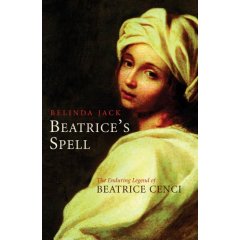
Beatrice's Spell: The Enduring Legacy of Beatrice Cenci. Belinda Jack
Not really about Beatrice Cenci, this book is a study of the sinister, and maybe fatal, fascination her story has had on a group of writers and artists.
The sad story of Beatrice Cenci is simply told. In 16th Century Rome, she was abused by her rich and powerful father. Her many appeals for justice and relief fell on the deaf ears of people afraid to intercede. Unable to escape or get help, she plots with her brother, her step mother and two servants to kill her father, end the abuse, and disguise the death as an accident. When the death is ruled a murder, they are tortured into confessions and then brutally executed for their crime. Almost 200 years later a painting by Guido Reni is found that many believe is a portrait of Beatrice painted on the eve of her death.
Her father's abuse of Beatrice is never specified, but he was a known sadist and a sodomite. In Rome, Beatrice, although convicted by the law, was popular both at the time of her death and for hundreds of years after. Reni's painting did much to extend her legend to the many foreign visitors to Rome.
But what Belinda Jack does is to look at how the story of the Cenci deeply affected the life and work of a group of authors and artists. This is a work of literary biography. The main focus is on the authors Percy Shelley, Herman Melville, and Nathaniel Hawthorne, the sculptor Harriet Hosmer, and the playright and actor Antonin Artaud.
The weakest part of this book is that Ms. Jack searches for the unspeakable in the lives of these people. What proof is there of the most secret of crimes? So while she is "grimly" engrossed in her study, all that she can truly point to is that these people "share various common traits and preoccupations."
These include a need to expose taboos, significant relationships with fathers or father figures, an interest in violence or even sadism, extreme responses to guilt, and bouts of severe depression or madness. In each case, learning the story of Beatrice Cenci exacerbates their imbalances, while compelling them to relate the story in their work.
This is a deeply disturbing book that hints at the profound impact of paternal sexual and physical abuse on people. Yet it is a book that brings to literary criticism itself an exposure of a hidden and unspoken tradition. For that reason, I feel this is an important work that will have lasting influence.
No comments:
Post a Comment